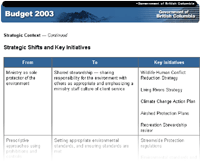 |
|
Strategic ContextVisionThe ministry's vision is a clean, healthy and naturally diverse environment that enriches people's lives, now and in the future. MissionThe ministry provides leadership and support to British Columbians to help them limit the adverse effects of their individual and collective activities on the environment, while fostering economic development and providing recreational opportunities. Organizational Values and PrinciplesThe ministry's leadership role in managing British Columbia's natural resources in an environmentally sustainable manner while enabling economic growth is guided by the following organizational values and principles. Organizational ValuesOur organizational and staff behaviour is informed by the following values:
PrinciplesWe are guided by the following principles to sustain our vision and achieve our goals:
Strategic ShiftsIn Service Plan 2002/2003 – 2004/2005, the ministry recognized that significant changes in its business methods were required to meet the government's and society's objectives for the environment and economy. To address this challenge, the ministry developed a set of strategic shifts. These shifts will enable the ministry to change its business practices to reduce costs and focus efforts in areas where the greatest risks to the environment exist. The ministry has made significant progress in realizing its strategic shifts, but challenges remain in completing the transition. Over the past decade, competition for ministry resources (between new priorities and traditional activities) and increased regulation have resulted in service backlogs, poor environmental monitoring and reporting systems, and limited capacity to conduct research or gather scientific information. As well, public perception of the ministry as having sole responsibility for environmental issues set unreasonable expectations. The ministry is actively pursuing opportunities for sharing the responsibility of protection and stewardship of the environment among governments, First Nations, communities, academic institutions, industries, volunteer organizations and individual British Columbians. This is a challenging agenda. However, as its strategic direction evolves, the ministry is establishing clear roles for itself, industry and other stakeholders in gathering, monitoring and reporting environmental information, achieving environmental objectives and identifying economic opportunities. New service delivery approaches also create opportunities to focus efforts, increase innovation and share responsibility. Some key initiatives are shown in the following table.
|
||||||||||||||||||||||||||||
|
|||||||||||||||||||||||||||||

